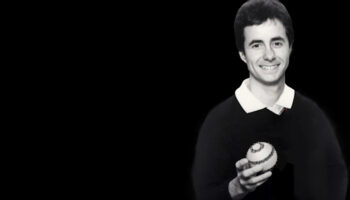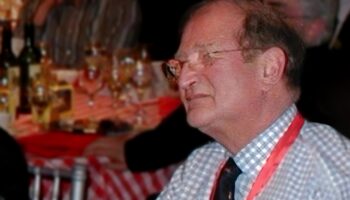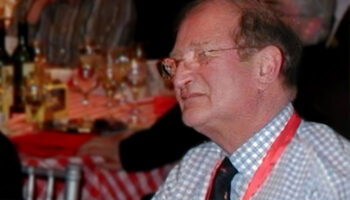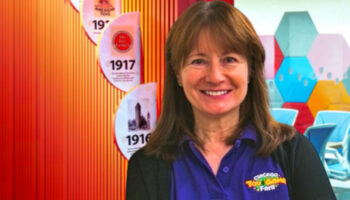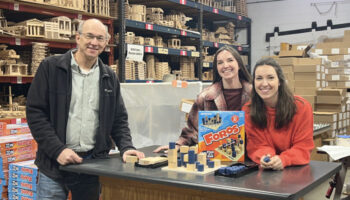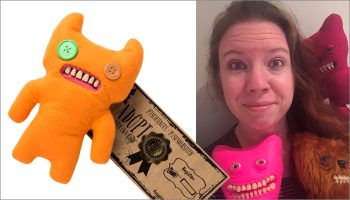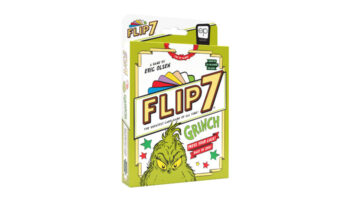Kremer and the Cube: Mike Moody of Seven Towns on the genius of I.D.I.O.T. Award winner Tom Kremer

Mike, until recently most of our readers knew you as Chief Executive of Seven Towns. Now they also know you for dancing on stage at the Mojo awards! Either way, we’ve chatted to you about your fantastic career here. You also worked very closely with the late Tom Kremer. Now, I don’t want to dwell on it unduly, Mike, but I know Tom had an extraordinary start to his life…
Yes, he did. I didn’t join the company until the 1990s, so it’s a long time before me, but I know a little about it. The family was from Transylvania – at the time part of Romania. His father – an ex-Prussian Army Officer – was an Electrical retailer. During the war, Nazi occupied Hungary moved into Romania and Jewish Families were driven into ghettos; appallingly treated and eventually taken off to concentration camps.
Yes. Awful. And Tom was – what? A teenager when he went to a concentration camp?
Yes, he was 14. He, his parents and brother went to Bergen-Belsen. And this isn’t really my story to tell, but I believe, they were finally liberated on the Kaster Train in 1944 and reached safety in Switzerland
Yes, and Chrisi Trussell said much the same thing when we spoke with her. People can read that here… In any case, I do want to acknowledge it. It must’ve shaped him.
Yes, undoubtedly. After that period, the family went different ways. Tom went off to Switzerland, then Israel for a while. His brother went to Rhodesia. Eventually, Tom came to the UK and went to Edinburgh University to study philosophy, which is where he met Lady Allison Balfour. Lady Allison later became his dear wife. After they came to London, he was in education in some way.
As a special-needs teacher, I think…
Right. From there, he eventually decided to start making some educational games for the kids who would not read books, initially starting with a board game Wordmaster. His ILEA school inspectors were impressed and suggested he get it made – so he came to the industry that way.

Fascinating! So he started by creating his own educational games?
Exactly. Tom was proving a very creative and able man, so he inevitably found a way to make an extra living with his own ideas. He was now an inventor as well as a game publisher, a resourceful thinker. Of course, I start to know a little more about what happened after Tom created Seven Towns because that’s been my focus for a very, very long time.
Indeed! Let’s move to that, then. So Tom has all that background; he’s married to Lady Allison…
That’s right, great grandniece of Henry Balfour – at one time, the Prime Minister and author of the Balfour Declaration. Anyway, Seven Towns was founded in 1963; we recently celebrated our 60th. And I believe the first games he worked after Wordmaster was called World Soccer and Shapemaster. He went out and had them manufactured and sold them himself – so he was doing the whole gamut.
And he’d been on his own up to this point?
Not entirely – by the mid Sixties, he formed a relationship with a wholesaler to whom he referred as Mr. Helpful. Ha! Mr. Helpful was the Financial Director of a UK subsidiary distributorship for a Hong Kong company – so that helped Tom. They became good friends. But even while he was running around, Tom was always learning… How to get things manufactured, where the resources were – all this sort of operational stuff. And it was Mr. Helpful that encouraged Tom to build up Seven Towns, things slowly started developing from in a very small office somewhere round the back of Hamley’s…
And in terms of the name Seven Towns, I’ve heard conflicting information about it…
Well, one never really knows because Tom passed away several years ago! But the story that’s become lore is that he came from a place in Transylvania which was known as the Valley of the Seven Towns. But there was no relationship between the Seven Towns name and the town where he came from – just that the valley had seven towns around it.
Got it. Thank you. So he’s learning what he can, he’s getting help from Mr. Helpful… But he’s substantially on his own?
He was on his own, yes, and that was very Tom; that was the way it was in those days. He was a very determined, enigmatic man… He knew what he wanted to achieve and – come what may – he’d go and achieve it no matter what.

He sounds like he could be quite steely…
He was strong in so many ways. And you know, the early days must’ve been quite stressful. I mean, they lived in very basic accommodation and were starting a family – all that sort of stuff. And I would say that just because you have a business, it doesn’t make you a wealthy man. You have to fight for it, and he certainly did. In those days it would’ve been really tough – going around looking for manufacturing sources and getting things done in Britain.
And before we move on, do we know what happened to Mr. Helpful?
I don’t think we do, no, he’s only referred to as that in Tom’s book. He started a company called Condor Games. Condor Games went on to sell all of Tom’s games over the years; Tom launched everything through Condor – until he learned a hard lesson about licensing and distributing products… Because eventually Mr. Helpful became not so helpful! His company had financial difficulties and eventually went out of business, giving Tom just several months’ notice. So Tom had to move his games to new homes – and quickly.
Right. I guess he had all his eggs in one basket…
Yes. So he started to work out that he should move to a licensing operation which is now very obviously our bread and butter, of course; it’s what we do. But back then, Tom was learning his way to market, which he did very well. As you know, Deej, by the seventies he became very successful. He found his way to America, to Japan and many other places.
I just want to pick up on something… We’ve said of Tom steely, determined, strong and enigmatic. What other words would you use to describe the man?
Charismatic… An enormous character and sense of humour, and a great ability to read people. He was a craftsman. He was intellectually very smart and creatively very strong. He was determined and persuasive… A real visionary. He could look at an invention and not only know what do with it, but also how to place it. He knew to whom he should show things, and which person was the right person in each company. And he’d have the strength of personality to drive an idea home; make very senior toy executives believe in an idea.

And, by all accounts, a fantastic negotiator?
Oh yes, an artful negotiator. He really knew the value of ideas and would work to have that value recognised. To that end, he had a great ability to look someone in the eye and say, “No” in such an emphatic way that you really stopped and listened. Over the years, I personally watched him sort out a number of people that were truly powerful in the industry. He would just say NO, and mean it… “No, I’m not doing that.” And if he had to pack it up and take it home, he would.
He always had that ‘walk-away power’?
Yes. He wouldn’t just give in, no matter how big the companies were. He valued his inventions. He believed he should be paid fairly for them, and he negotiated in a very strong and creative way. To a degree, some people didn’t like that. And maybe that’s because he had, quite early on, that rude awakening with Condor’s demise… From then on, he built structure around deal making, which became the foundation rules of this company today.
Makes absolute sense. And it almost goes without saying that a lot of our conversation here is going to turn towards the Rubik’s Cube. How did Tom come to be in a place to discover that?
When Tom first started going out into toy world, he went to Nuremberg Toy Fair, obviously, where he years later found the Rubik’s Cube. Tom started exhibiting in Nuremberg inside what you could quite fairly call a box with a curtain… This tiny cube of a room with a curtain on the front. Nothing else! He would be behind that screen; he’d set himself up to show his ideas. Mostly he’d show them himself, maybe with Chrisi Trussell – she would’ve been with him by that time. Also, it’s worth saying that Tom was an absolute stickler for timekeeping. If he had appointments in that little room, they HAD to be on time!
What would he do if they weren’t?
If you missed the slot, he’d tell you straight: you missed your slot! Timekeeping in the toy industry’s very casual now but, in those days, it was very formal – especially in Germany. He used to have that rule: your slot is this half hour, and if you don’t make it, I’m booked the rest of the day. He wouldn’t keep other people waiting to fit latecomers in and it set an operational standard that still prevails today.

So… In terms of Tom and the Rubik’s Cube, I’ve always held the view that while Ernö invented it, Tom made it legendary. How do you see that?
Well, yes, it’s an interesting story. While Tom was at Nuremberg Toy Fair in 1979, he saw a man called Tibor Laczi showing the Cube. He was acting as a kind of sales agent for the Cube.
But it’s not a prototype at this point? It’s a finished product?
Yes, by 1979, it was already a plastic cube, a functional product. It was called Magic Cube. But in those days, Hungary was still part of the Communist Bloc. So if you invented something, the government automatically controlled sales and manufacturing. So at that time, the Cube was a very Hungarian affair. But they were trying to sell it, and Tom – because he knew enough Hungarian – was able to understand what was being said about the product and said, “Well, maybe I can help…”
Magic words to the sales guy! And interesting that Tom was listening so carefully…
And you know, this is what I do when I go around toy fair. I’m listening as much as I’m looking because it’s surprising what you find. From time to time, you see the most obscure things and think, ‘Oh, that hasn’t got a chance!’ but actually, you need to listen – you never know. Anyway, by that time, Tom had got all these contacts and was able to pick up that Mr. Laczi – well, I think he was a doctor, in fact – Dr. Laczi wasn’t really going to get very far, mostly speaking Hungarian and atrocious English to a mainly German audience. So Tom explained what he could do for the Cube…
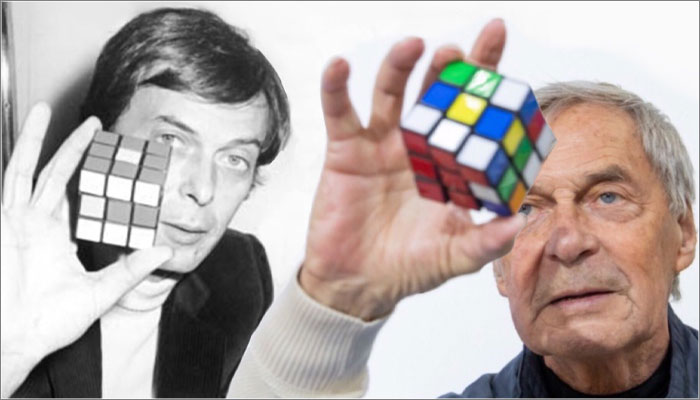
In a way, he was selling himself to the salesman?
Yes. And while Tom was taken with the item, he knew it required something rather different to break through. He thought it was really original but there were a few major reasons that people were passing on the item – and went on passing even after Tom took it on. One of the big reasons is that it didn’t come with a solution. Another was categorising it… I mean: what is this cube? Is it a toy? A puzzle? A game? A Novelty? These things alone were huge hurdles to placing it… And oh yes! By the way folks: it’s made in the communist bloc! Ha!
Ha! I think our industry has this fascinating cul-de-sac of creativity… If we see something TOTALLY new, and no one can categorise it… Well, it’s too revolutionary; it feels like an enormous risk.
Exactly. And, understandably, what most retailers will say in such a situation is that the ideas are really interesting – but that they don’t have a slot for it! Because where do they put it? The brainteaser category literally didn’t exist back then.
So no category, no solution. How, then, does Tom see the potential?
He could just feel it was something special, and he had the vision to realise that. But, you know, he went to many, many toy companies and met those very responses. It was also a one player thing – so it’s not a game… It’s not anything. Eventually, though, it makes its way to Lionel Weintraub, who was by then was President of Ideal Toy. It was just that time of year when he was looking for the next big thing to try and boost Ideal into the next year. Tom convinced them the Cube was that thing… Even though at this point there was still no solution. – but Tom was canny, he recognised that the cube could be sold in its solved position and – in a ‘Newton like’ moment – he figured it must be possible to return it to that position… He gambled a solution would emerge!
Good God. It feels like madness, even in hindsight!
Yes! Tom had had more passes on the Cube than probably anything else Seven Towns has ever presented… But Ideal Toy was having hard times, and Lionel was looking for something that he could put on TV. And of course, the Cube looked great on TV and took off into the millions. Which made Lionel, Tom and Ernö Rubik very happy! It really helped, I think, that when Ernö and Tom met, they could talk because they shared enough language between them.
This is great! I’m loving this, Mike; what a story! I do, though, have an impertinent question! Perhaps an impossible one… I’m really curious about this: If Tom Kremer had ignored the Cube, would it have been the same success?
Interesting question. I would say not… And yes, it may well have been missed altogether because it’s unlikely they would’ve continued bringing the Cube back to Nuremberg every year trying to make it stick…

That’s exactly what I’m thinking. Plus, the language barriers, market reluctance are huge factors. So without Tom’s persistence…
Yes. It’s very much a case of right time, right place, right language. A great maxim – one I use quite a lot of the time. Another one I feel is true and pertinent here is that opportunity rarely knocks twice. And most of us miss it… Even to the point where you don’t know you missed it.
Yes. You don’t know what would’ve happened if you turned left when you should’ve gone right…
Right. And it’s quite common in this industry. How many people will tell you that they were offered the Cube and passed? Or Trivial Pursuit?
Oh, my days! Not a month goes by without someone talking about a huge opportunity that they passed on. Almost like war stories!
Right! And these things all come into the ethos of Seven Towns… If we see something interesting, whether it’s got a category, or is missing a solution – don’t worry about it. Learn from Kremer and the Cube.
Well, there’s my headline! “Kremer and the Cube”! Ha!
Ha! And that’s where the story takes another twist – so to speak. Because, arguably, the Cube made Seven Towns world renowned while the Cube soared – for two years…

For two glorious years! It’s a craze; a sensation. And then it’s like the Hula Hoop? It gets to the point where everybody that wants a Cube HAS a Cube?
Yes. Then suddenly NOBODY wants a Cube! Now, obviously Seven Towns, Rubik and the Hungarian government did very, very well out of that and by that time, Tom had made the cube a global phenomenon. So, when it came to an end in ’82, it did what fads do… Dropped off a cliff – finished!
But to clarify, during that first fad, a solution appeared?
Oh, yes – soon there WAS a solution, and there were books about the solution… Then it turns out there’s more than one solution, and then there were a whole load of other products launched. But when the Rubik’s Cube fell off a cliff, the other products largely did the same. And that hurt Ideal Toy, which didn’t carry on for much longer. And that was that for Rubik until there was a relaunch in 1986 with Matchbox, who also came out with Rubik’s Magic.
The flat plate with the linking rings?
Exactly. Rubik’s Magic was clever but – by 1987 – it had gone again. And the Cube relaunch hadn’t really stuck, but it happened well enough to make some money. It was another 10 years before the Cube came back again.
Extraordinary story. So really the Cube got Seven Towns into America, followed by Rubik’s Magic, Rubik’s Snake… A plethora of product in a nascent category! But there were these other ideas, too?
Right. Tom went on to develop many new non-Rubik products with a couple of inventing guys on board – John Wallace and Chris Brewer. They were two industrial design guys that joined Tom and stayed for decades. Tom and the team came up with a whole range of other games too… Things like Forbidden Bridge, Frog Soccer, Dream Phone and Game of the Year…

Which is in your collection here…
Yes – on the shelves there you can see Great Game of Britain and The London Game. They were both with Condor after Rubik. There are toys like Boglins, Sectaurs, Junior Monopoly, Dream Phone, Game of the Year, Dohnutters… They’re all there. They became the core of where Seven Towns was going – and there were indeed some big hits…
As a result of that success, Tom built a team – he hired more designers, worked with other inventors and developed more products. And obviously, the company had more money. So then Tom took a certain amount of that hard-earned income and reinvested it in acquiring the Rubik trademarks from all those companies around the world at a point when it had gone off a cliff.
And that’s the point, I think, at which Tom transcends clever guy to become a genius. After the Cube’s gone off a cliff – so at a time when most people are up for selling the rights – Tom bought them up; all over the world! He’s a genius.
Yes. A masterstroke; brilliant! He took control of the Rubik’s brand by virtue of the trademarks. Of course, Ernö was a partner in all of that, and that relationship with Seven Towns goes on right up until the day it was sold to Spin Master. But it was Tom’s ingenuity to work out the business map for Rubik beyond the first collapse. Without question, Tom was the driver of that. He saw the value in Seven Towns owning and protecting all those rights and taking action against copies.
Absolutely brilliant – but then in 1990’s the Rubik’s Cube had its revival.
Yes, the next chapter demonstrates the degree to which the toy industry is about connections. When Matchbox had Rubik for a short time in 1986, ’87, it was under the watchful eye of Nick Austin. But his number two was John Barbour…
Both I.D.I.O.T. Award winners; people can read their interviews here and here…
Well, after John left Matchbox, he became marketing director of OddzOn in America – of Koosh Ball fame – and eventually CEO, I think. As such, he wanted to relaunch the entire Rubik line. This would be in 1995 or so, and Tom was eager.
Nick Austin wasn’t in this part of the picture?
No, by that time Matchbox had been acquired by Tyco and Nick had successfully started Vivid Imaginations. OddzOn launched the line in America and reached far and wide using the same successful tactics they had with Koosh.

Amazing!
And it grew exponentially through the late nineties. Hasbro had acquired Oddz On in 1997, around the time I joined Seven Towns. There were many new licensees throughout the world and Rubik was picking up momentum. By 2005 it was ubiquitous once again – indeed a brand in its own right… Which is what Tom always felt would happen. Then, in 2007, it blew the roof off when the movie The Pursuit of Happyness hit the silver screen.
Will Smith playing with a Cube was HUGE. Was there something else around that time as well?
Yes, The Pursuit of Happyness pulled a massive global audience and marketers also saw the Cube’s value in that whole area of pop culture. That’s when it began its transition into a lifestyle brand. And let’s not forget that around this time – 2006, 2007 – the Revolution Cube launched. The Revolution Cube was an electronic Cube… That did huge business!
But that’s the extraordinary thing – it came back again even stronger! I think you sold more Cubes than you did in the first craze!
Yes. It came back again and has sustained for a much longer period… It went up and it stayed up – which was exactly Tom’s vision.
Absolutely extraordinary. You know, I was going to ask why you thought Tom won an I.D.I.O.T. Award… But it’s completely redundant because the answer is, “He was a genius!” Ha!
Ha! Yes! Yes. And popular, too. Tom didn’t go to the Inventors Dinner all that often, but when he did go, everyone would want to talk with him. He’d usually be with Eddy Goldfarb, Nick Austin, John Barbour, Mike Bucher and I think Bob Moog. That was a group of such big characters – all sat there, mixing it together!

Most of the folk you mention there are I.D.I.O.T. winners, so I’ll ask Adam Butler to turn all their names into links. One thing that strikes me as a little odd is that Tom Kremer was one of five people that were given a mini I.D.I.O.T. Award in 1996. Not to disparage those awards, or that decision, but I have some trouble reconciling that… It seems to me like he deserved a spotlight of his own.
Yes, in my own view he should have been awarded the full I.D.I.O.T., but – as I understand it – they were trying to give away more awards. In fairness, Tom never commented on that; too much of a gentleman!
And at the point when you joined Seven Towns, Mike, how involved was Tom?
Still involved! By that time, David Kremer, his son, had been MD for several years. David hired me to come in and work with him because Tom was working on Winning Moves in the UK, US, France and later Germany.
Ah! Yes. Tell me a little about Winning Moves…
Tom founded Winning Moves in 1995 with three partners: Philip Orbanes, who’d been with Parker Brothers; Mike Meyers from Milton Bradley, then Hasbro; and Alex Randolph – a game inventor. The four of them started Winning Moves in the US, building on a base of inactive versions of Hasbro classics. By 2001, they were getting Rubiks and Pass the Pigs to the mom-and-pop stores across America…
In Europe, the focus was on Monopoly city editions, and then Top Trumps. That happened because Top Trumps was an inactive brand and Tom knew where the rights were from the days when Hasbro bought Waddingtons. He believed there was a big opportunity for both, and he had he had a very good relationship with Jane Ritson Parsons, who was running Hasbro licensing – they hatched a deal. So Tom more or less created Winning Moves Europe to capitalise on these brands.

Very clever man… He was great with these re-awakenings, wasn’t he?
Yes. He could see and think on many levels; a real lateral thinker… Another example of that is Monopoly Junior. Tom figured that if Scrabble could do a junior version, why couldn’t Parker Brothers do it with Monopoly? But at that time, Parker saw Monopoly as a game for age ten plus – a family game. Tom invented a junior version anyway, and continued pushing… And as we know, that junior version opened up a whole new brand positioning which has proved so successful. So yes – Tom was very good at looking at what established brands do from an outside perspective, and thinking: what else can I do with that? And that remains part of our business model today.
And did Tom run Winning Moves from here in Notting Hill?
Yes, Tom initially drove the growth of Winning Moves while still operating from the office here. In due course, they worked out of offices quite near here in Paddington. He later hired Tom Liddle for the UK division, and they did Monopoly City editions and relaunched Top Trumps – still flourishing and thriving today. And there’s one more venture that Tom got into – publishing books.
Yes. Notting Hill Editions. What was the impetus behind that? Do you know?
Well, initially the books had a specific aim. They were designed to revive the art of the essay, so they were quite short. And again, Notting Hill Editions still exists today – Tom’s daughter runs it: Kim Kremer. They put out half a dozen titles a year. Tom did a few titles himself in the early days. Some of them I have here, look… This particular title – The Missing Heart of Europe – is about the UK’s place in Europe.
Incredible. So many achievements! And that leads to my final question, I suppose, Mike… Tom passed over in 2017. Do you miss him?
Oh yes, absolutely. We all miss Tom. But you know, he was and remains ever present… His picture’s on the wall in the corridor here, and many of the team remember him and miss him. We miss his charm, and we miss his wit, his warmth and his whip.
Ha! His wit, his warmth and his whip! Oh, that’s fantastic! Ha! That’s so great; that’s the perfect note to end on. Mike, thank you so much for this. I’m really grateful that you spent so much of your time giving me an insight into a man who really does strike me as a genius.
–
To stay in the loop with the latest news, interviews and features from the world of toy and game design, sign up to our weekly newsletter here




